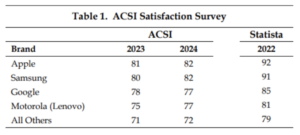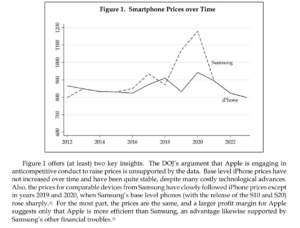Our friends at the Phoenix Center have published a compelling study on the Justice Department’s flimsy antitrust case against Apple. The DOJ alleges that “to protect its smartphone monopoly… Apple repeatedly chooses to make its products worse.” Seriously? How can a company expand its market share by making a worse product at a higher price?! The Phoenix Center study rips these “monopoly” charges to shreds and points out that Apple’s phones have a high consumer satisfaction rating.
Their overall conclusion is worth reading:
First, Apple is not a monopoly, but competes against many established mobile device manufacturers, with a global market share of less than 30%.
Second, degrading product quality as a means of customer retention is counterintuitive and is belied by high customer satisfaction ratings for Apple products, including by sophisticated enterprise users.
Third, the DOJ’s claim regarding Apple’s “extraordinary profits” is inconsistent with the evidence–the company’s profit margins are not unusually high compared to industry averages.
Fourth, Apple’s design choices, absent regulatory intervention, and pricing strategies are uniform globally, contradicting the DOJ’s theory that these practices are correlated with market share.
This chart from the paper is also devastating to the government’s case, which claims that Apple uses its alleged monopoly to jack up prices. It shows that Apple’s prices are essentially flat and its major competitor, Samsung, has HIGHER prices.


